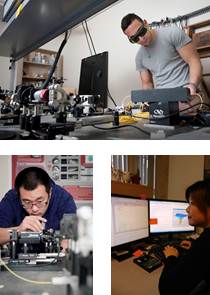Summer 2020 USRA Opportunities
1) Laser Tracking System
2) Sensorless Adaptive Optics System Design
3) Optical Imaging Systems and Applications
4) Real Time Software Systems
Background: Non-invasive imaging provides
the ability to look under the surface of samples without causing damage. Techniques like CT, MRI, and ultrasound are useful for whole body imaging, and microscopes are used for looking at cells. There is a missing layer between them for studying features of intermediate scale, on the order of millimeters. An emerging technique for imaging is called Optical Coherence Tomography (OCT)
which is similar in principle to ultrasound, but uses light instead of sound
waves. OCT systems have resolution and imaging depth intermediate between
microscopy and high frequency ultrasound, filling an important technological
gap. OCT is widely used to image eyes (ophthalmology), diagnose cancer, and
also as a tool to augment studies in developmental biology.
Skills: high-level language programming skills (eg C, C++, C#) are a must. Minimum requirements are completing of ENSC 251, or equivalent. Experience with GPU programming would be an asset.
1) Laser Tracking System
Objectives: This research project will develop a high-speed image tracking system for guiding laser treatments during real-time OCT volume acquisition. The initial modules the student will be designing will focus on furthering the existing work on real-time image segementation of OCT data, and feature tracking. Additional work will include laser power control to apply a high power laser to selected features in the images. This project will strengthen the student's software design skills in real time applications. Understanding optics and lasers is not required, but completion of advanced programming courses would be a plus.Skills: high-level language programming skills (eg C, C++, C#) are a must. Minimum requirements are completing of ENSC 251, or equivalent. Experience with GPU programming would be an asset.
2) Sensorless Adaptive Optics System Design
Objectives: The purpose of this project is to learn about high resolution imaging using adaptive optics (AO). The same AO technology that is used for sharpening the focus of telescopes acquiring images of the stars can also be used for high resolution microscopy. The purpose of AO is to correct aberrations in the lenses and in the sample in order to obtain diffraction limited imaging performance. The student will participate in on going development of a computational approach to aberration correction similar to autofocus on a camera, but also correcting higher order aberrations. The first portion of the project will focus on developing and understanding of the theory, followed by an experimental concentration in one aspect as determined by the Undergraduate Research Assistant's strengths and interests.Skills: Students that have completed the undergraduate courses in MATH (ie 251, 254) and E&M (ENSC 316) are preferred.
3) Optical Imaging Systems and Applications
Objectives: The purpose of this project is to learn about optical imaging for medical applications, with a focus on ophthalmology, using Optical Coherence Tomography. The Undergraduate Research Assistant will spend time in the BORG lab at SFU and also be given opportunity to work at the Vancouver General Hospital Eye Care Centre. The work will involve system design, data acquisition, image processing with MatLab, and and 3D visualization software for presentation. The work on the project is diverse, ranging from optics, to programming, to clinical research, and data analysis. Concentration in one aspect of the project will be determined by the Undergraduate Research Assistant's strengths and interests.Skills: Overall excellence in Biomedical Engineering.
4) Real Time Software Systems
Objectives: The purpose of this project is to learn about software engineering for real-time applications. The Undergraduate Research Assistant will concentrate on applying engineering skills to an existing software system. Experience with object oriented programming, and C/C++ is a essential.Skills: Minimum requirements: ENSC 251. Preference will be given to students that have completed other undergraduate courses in programming (ie ENSC 351, CMPT 225, etc.).

